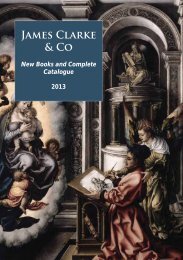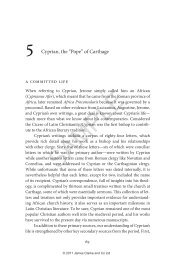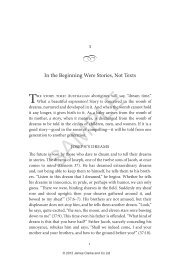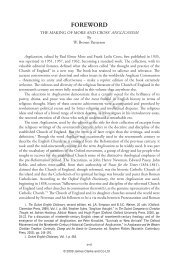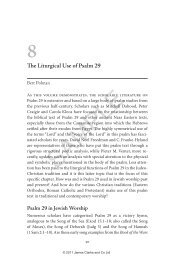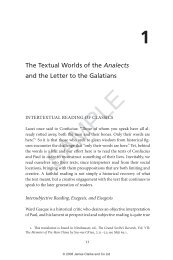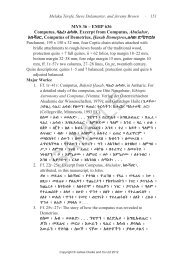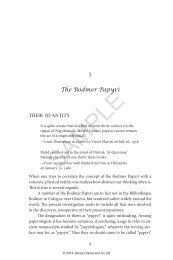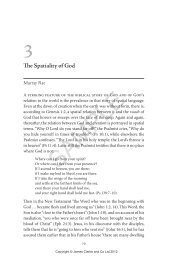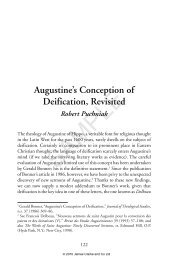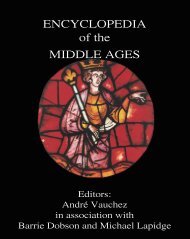Introduction by Kirk R. MacGregor - James Clarke and Co Ltd
Introduction by Kirk R. MacGregor - James Clarke and Co Ltd
Introduction by Kirk R. MacGregor - James Clarke and Co Ltd
You also want an ePaper? Increase the reach of your titles
YUMPU automatically turns print PDFs into web optimized ePapers that Google loves.
<strong>Introduction</strong><br />
tion of the elect, without controlling with certainty the necessary means<br />
on which the outcome depends. The systematic nature <strong>and</strong> logical consistency<br />
of Calvin’s model rendered it a quite attractive export to Reformed<br />
communities in the Netherl<strong>and</strong>s, France, <strong>and</strong> Scotl<strong>and</strong>. Moreover, in<br />
Engl<strong>and</strong> the traditional quasi-Catholic exterior of the church received<br />
new life from the Calvinist doctrinal stream. This stream’s perception of<br />
biblical fidelity led opponents of the Anglican Church who migrated to<br />
the New World, notably the Puritans <strong>and</strong> Particular Baptists, to place perseverance<br />
of the saints at the center of their theology.<br />
Perseverance of the saints emerged to a position of prominence across<br />
the American religious l<strong>and</strong>scape as a result of the First (c. 1730–1760)<br />
<strong>and</strong> Second (c. 1800–1830) Great Awakenings, nineteenth-century evangelical<br />
revivalism characterized <strong>by</strong> Charles G. Finney (1792–1875) <strong>and</strong><br />
Dwight L. Moody (1837–1899), <strong>and</strong> the Princeton school of Calvinist orthodoxy<br />
(c. 1810–1920). Starting among the Calvinistic Dutch Reformed<br />
<strong>and</strong> Pres<strong>by</strong>terians of the middle colonies, the First Great Awakening<br />
spread to <strong>Co</strong>ngregationalist New Engl<strong>and</strong> through the efforts of Jonathan<br />
Edwards (1703–1758), arguably the foremost American theologian. In<br />
his sermons <strong>and</strong> treatises, Edwards emphasized the sovereignty <strong>and</strong> the<br />
love of God, maintaining that all who have embraced Christ are continually<br />
<strong>and</strong> infallibly drawn <strong>by</strong> God’s love to himself <strong>and</strong> to his service over<br />
the course of life. 1 Although unabashedly Reformed in his conviction<br />
that those who embrace Christ were first predestined to do so, Edwards’<br />
message, echoed as it was <strong>by</strong> Particular (or Regular) Baptist preachers,<br />
gradually became attached in the popular mindset to the notion of conversion:<br />
once individuals passed out of “nominal Christianity” through<br />
born-again experiences where they, <strong>by</strong> repentance <strong>and</strong> faith, became new<br />
creatures in Christ, they were forever sealed <strong>by</strong> the Holy Spirit for the<br />
day of salvation. By the time of the Second Great Awakening, pastors<br />
<strong>and</strong> theologians without Reformed persuasions proclaimed a new variant<br />
on eternal security representing a theological halfway house between<br />
synergism <strong>and</strong> monergism, where those who freely chose to respond to<br />
God’s prevenient grace are then supernaturally preserved in faith until<br />
beatitude. This variant arose as a regular ingredient in the frontier preaching<br />
of camp meetings <strong>and</strong> tent revivals, alongside the Reformed model of<br />
perseverance which received fresh propagation at the h<strong>and</strong>s of Princeton<br />
SAMPLE<br />
1. Cairns, Christianity, 367.<br />
xviii<br />
© 2011 <strong>James</strong> <strong>Clarke</strong> <strong>and</strong> <strong>Co</strong> <strong>Ltd</strong>



